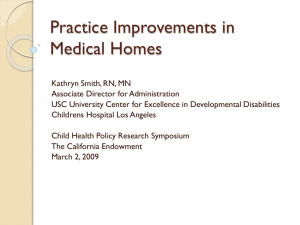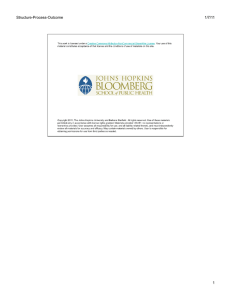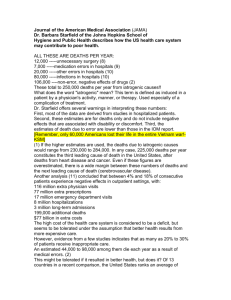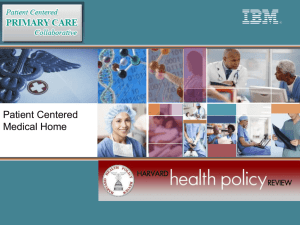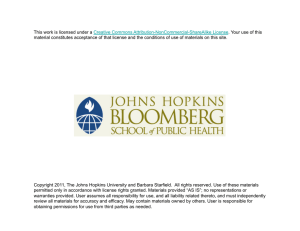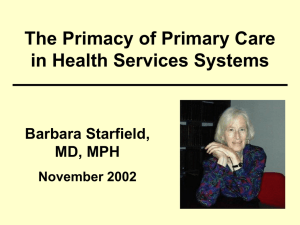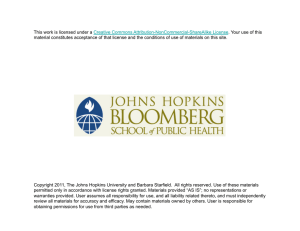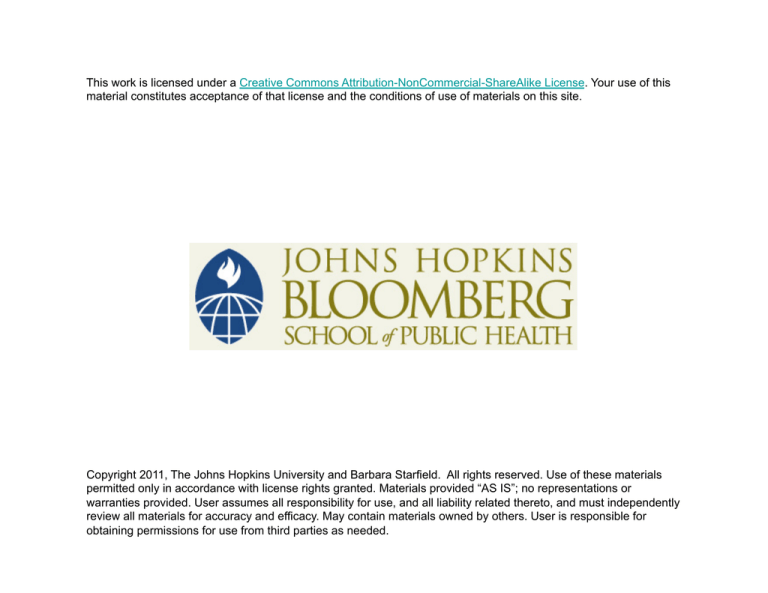
This work is licensed under a Creative Commons Attribution-NonCommercial-ShareAlike License. Your use of this
material constitutes acceptance of that license and the conditions of use of materials on this site.
Copyright 2011, The Johns Hopkins University and Barbara Starfield. All rights reserved. Use of these materials
permitted only in accordance with license rights granted. Materials provided “AS IS”; no representations or
warranties provided. User assumes all responsibility for use, and all liability related thereto, and must independently
review all materials for accuracy and efficacy. May contain materials owned by others. User is responsible for
obtaining permissions for use from third parties as needed.
The Effectiveness
of Primary Care
Barbara Starfield, MD, MPH
Primary Care Course
(Based on Cape Town, South Africa, 2007;
and Barcelona, Spain, 2009)
This presentation provides evidence
from the 1990s and early 2000s
(concomitant with the growth of interest
in primary care in the world) concerning
the impact of primary care-oriented
health systems on population health
outcomes and on distribution of these
outcomes (“equity”) from cross-national
and selected within-nations studies.
Starfield 02/11
PCB 7459
Life Expectancy Compared with GDP
per Capita for Selected Countries
Starfield 11/06
IC 6440 n
Country* Clusters: Health Professional
Supply and Child Survival
Starfield 07/07
HS 6333 n
Life Expectancy and Income per Capita
Starfield 06/06
IC 6593 n
The global imperative is to organize health
systems around strong, patient-centered, i.e.,
Primary Care.
A disease-by-disease approach will not
address the most serious shortfall in
achieving the health-related Millennium
Development Goals. It will also worsen global
inequities. Those exposed to a variety of
interacting influences are vulnerable to many
diseases. Eliminating diseases one by one
will not materially reduce the chances of
others.
Sources: IBRD/World Bank, April 8, 2008. King
& Bertino, PLoS Negl Trop Dis 2008;2:e209.
Starfield 03/08
GH 6944
The Sixty-second World Health Assembly
– WHA 62.12 – Agenda Item 12.4
22 May 2009
… Strongly reaffirming the values and principles of primary
health care, including equity, solidarity, social justice, universal
access to services, multisectoral action, decentralization and
community participation as the basis for strengthening health
systems … URGES member states:
1. to ensure political commitment at all levels …
2. to accelerate action towards universal access to primary
health care by developing comprehensive health services
and by developing national equitable, efficient and
sustainable financing mechanisms …
3. to put people at the centre of health care …
Starfield 05/09
PC 7136 n
The Sixty-second World Health Assembly
– WHA 62.12 – Agenda Item 12.4
22 May 2009 (continued)
4. to promote active participation …empowering communities,
especially women, in the processes of developing and
implementing policy and improving health and health care, in
order to support the renewal of primary health care
5. to train and retain adequate numbers of health workers, with
appropriate skill mix, including primary health care nurses,
midwives, allied health professionals, and family physicians
… in order to respond effectively to people’s health needs
6. to encourage that vertical programs (be) … integrated and
implemented in the context of integrated primary health care
Starfield 05/09
PC 7137
The Sixty-second World Health Assembly
– WHA 62.12 – Agenda Item 12.4
22 May 2009 (continued)
7. to improve access to appropriate medicines, health products,
and technologies, all of which are required to support primary
health care
8. to develop and strengthen health information and
surveillance systems, relating to primary health care … to
facilitate evidence-based policies and program and their
evaluation
9. to strengthen health ministries, enabling them to provide
inclusive, transparent and accountable leadership of the
health sector and to facilitate multisectoral action as part of
primary health care …
Starfield 05/09
PC 7138
Aspects of Care That Distinguish
Conventional Health Care from PeopleCentred Primary Care
Source: World Health Organization. The World Health Report 2008:
Primary Health Care – Now More than Ever. Geneva, Switzerland, 2008.
Starfield 05/09
PC 7123 n
Primary health care is primary
care applied on a population
level. As a population/public
health strategy, it requires the
commitment of governments to
develop a population-oriented
set of primary care services in
the context of other levels and
types of services.
Starfield 07/07
PC 6305 n
Primary care is the provision of
first contact, person-focused,
ongoing care over time that
meets the health-related needs
of people, referring only those
too uncommon to maintain
competence, and coordinates
care when people receive
services at other levels of care.
Starfield 07/07
PC 6304 n
Why Is Primary Care
Important?
Better health outcomes
Lower costs
Greater equity in health
Starfield 07/07
PC 6306 n
Evidence for the benefits of primary care-oriented
health systems is robust across a wide variety of
types of studies:
• International comparisons
• Population studies within countries
– across areas with different primary care
physician/population ratios
– studies of people going to different types of
practitioners
• Clinical studies
– of people going to facilities/practitioners differing
in adherence to primary care practices
Source: Starfield et al, Milbank Q 2005; 83:457-502.
Starfield 03/08
PC 6924 n
Primary Care Scores, 1980s and 1990s
1980s
1990s
Belgium
France*
Germany
United States
0.8
0.5
0.2
0.4
0.3
0.4
0.4
Australia
Canada
Japan*
Sweden
1.1
1.2
1.2
1.1
1.2
0.8
0.9
Denmark
Finland
Netherlands
Spain*
United Kingdom
1.5
1.5
1.5
1.7
1.7
1.5
1.5
1.4
1.9
*Scores available only for the 1990s
Starfield 07/07
ICTC 5446 an
Primary Care Orientation of
Health Systems: Rating Criteria
• Health System Characteristics
– Type of system
– Financing
– Type of primary care practitioner
– Percent active physicians who are specialists
– Professional earnings of primary care physicians
relative to specialists
– Cost sharing for primary care services
– Patient lists
– Requirements for 24-hour coverage
– Strength of academic departments of family medicine
Source: Starfield. Primary Care: Balancing Health Needs,
Services, and Technology. Oxford U. Press, 1998.
Starfield 11/02
PC 5403 n
System Features Important to Primary Health Care
Resource
Allocation Progressive
Cost
Compre(Score)
Financing* Sharing hensiveness
Belgium
France
Germany
US
0
0
0
0
0
0
1
0**
0
0
2
0
0
0
0
0
Australia
Canada
Japan
Sweden
1
1
1
2
2
2
2
2
2
2
1
1
2
2
1
1
Denmark
Finland
Netherlands
Spain
UK
2
2
2
2
2
2
2
0
2
2
2
1
2
2
2
2
2
2
1
2
Sources: Starfield. Primary Care: Balancing Health Needs, Services, and
Technology. Oxford U. Press, 1998. van Doorslaer et al. Equity in the Finance and
Delivery of Health Care: An International Perspective. Oxford U. Press, 1993.
*0=all regressive
1=mixed
2=all progressive
**except Medicaid
Starfield 11/06
EQ 5599 n
Key system factors in achieving primary
health care in both developing and
industrialized countries are:
• Universal financial coverage, under
governmental control or regulation
• Efforts to distribute resources
equitably (according to degree of
need)
• No or low co-payments
• Comprehensiveness of services
Sources: Starfield & Shi, Health Policy 2002; 60:201-18.
Gilson et al, Challenging Inequity through Health Systems
(
http://www.who.int/social_determinants/resources/csdh_media/
hskn_final_2007_en.pdf; accessed March 17, 2009).
Starfield 07/07
GH 6739 n
Primary Care Orientation of
Health Systems: Rating Criteria
• Practice Characteristics
– First-contact
–
–
–
–
–
Person-focus over time
Comprehensiveness
Coordination
Family-centeredness
Community orientation
Source: Starfield. Primary Care: Balancing Health Needs,
Services, and Technology. Oxford U. Press, 1998.
Starfield 04/09
PC 5404 n
PC 7118
• First contact avoids unnecessary specialist
visits.
• Person-focus over time avoids diseasefocused care (makes care more effective).
• Comprehensiveness avoids referrals for
common needs (makes care more
efficient).
• Coordination avoids duplication and
conflicting interventions (makes care less
dangerous).
Starfield 04/09
PC 7118
System (PHC) and Practice (PC) Characteristics
Facilitating Primary Care, Early-Mid 1990s
GER
FR
BEL
US
SWE
JAP
CAN
FIN
AUS
SP
DK
NTH
UK
*Best level of health indicator is ranked 1; worst is ranked 13;
thus, lower average ranks indicate better performance.
Based on data in Starfield & Shi, Health Policy 2002; 60:201-18.
Starfield 03/05
ICTC 5366 an
Primary Care Score vs. Health
Care Expenditures, 1997
UK
DK
NTH
SP
FIN
AUS
SWE
CAN
JAP
GER
BEL
FR
Based on data in Starfield & Shi, Health Policy 2002; 60:201-18.
US
Starfield 11/06
ICTC 5365 an
Primary Care Strength and Premature
Mortality in 18 OECD Countries
Starfield 11/06
IC 5903 n
Primary Care Oriented
Countries Have
• Fewer low birth weight infants
• Lower infant mortality, especially
postneonatal
• Fewer years of life lost due to suicide
• Fewer years of life lost due to “all except
external” causes
• Higher life expectancy at all ages except
at age 80
Sources: Starfield. Primary Care: Balancing Health Needs, Services, and
Technology. Oxford U. Press, 1998. Starfield & Shi, Health Policy 2002; 60:201-18.
Starfield 07/07
IC 6341 n
Primary health care oriented countries
• Have more equitable resource distributions
• Have health insurance or services that are
provided by the government
• Have little or no private health insurance
• Have no or low co-payments for health services
• Are rated as better by their populations
• Have primary care that includes a wider range
of services and is family oriented
• Have better health at lower costs
Sources: Starfield and Shi, Health Policy 2002; 60:201-18.
van Doorslaer et al, Health Econ 2004; 13:629-47.
Schoen et al, Health Aff 2005; W5: 509-25.
Starfield 11/05
IC 6311
Comparisons of Policy (PHC)
and Clinical (PC) Characteristics
Canada
UK
US
System characteristics related to primary care
Type of system
1.0
2.0
0.0
Financing
2.0
2.0
0.0
Cost sharing for primary care
2.0
2.0
0.0
First contact
1.0
2.0
1.0
Longitudinality
1.0
2.0
0.0
Comprehensiveness
2.0
2.0
0.0
Coordination
0.5
1.0
0.0
Family-centeredness
1.0
2.0
0.5
Community orientation
0.5
2.0
0.0
Primary care practice characteristics
Source: Starfield & Shi, Health Policy 2002;60:201-18.
Starfield 07/09
IC 7146 an
Health “Outcomes”: Canada vs. US*
(Rank among OECD Countries, 2004-5)
*age standardized
where appropriate
LE birth
9 vs 25
LE age 65 (males)
4 vs 8
LE age 65 (females)
4 vs 14
PYLL (age 70)
13 vs 21
IHD mortality (males)
7 vs 5
IHD mortality (females)
7 vs 9
Stroke mortality (males)
2 vs 4
Stroke mortality (females)
3 vs 6
All cancer mortality (males)
12 vs 7
All cancer mortality (females)
22 vs 23
Infant mortality
24 vs 26
Asthma mortality ages 5-39
18 vs 21
Sources: OECD Health data 2009.
Starfield, Health Aff 2010;29:1030-6.
Starfield 02/10
IC 7157 n
Why Does Primary Care Enhance
Effectiveness of Health Services?
• Greater accessibility
• Better person-focused prevention
• Better person-focused quality of clinical
care
• Earlier management of problems (avoiding
hospitalizations)
• The accumulated benefits of the four
features of primary care
Source: Starfield et al, Milbank Q 2005;83:457-502.
Starfield 05/09
PC 7121
Is Primary Care as
important within
countries as it is among
countries?
Starfield 07/07
WC 6312 n
State Level Analysis:
Primary Care and Life Expectancy
HI
MN
IA
ND
UT
NE
ID
SD
OK
MI
IN
MO
TX
DE
OH
AL
NV
GA
TN
WV
MS
SC
KY
KS
NH
NJ
PA FL
WY
WI
RI
ME
AZ
NM
AR
CO
VA
MT
IL
OR
WA
MA
CA
CT
VT
NY
MD
NC
AK
LA
Source: Shi, Int J Health Serv 1994;24:431-58.
Starfield 04/09
WCUS 5835 n
In Ontario, Canada, the supply of GPs
(less than 7 per 10,000 versus 7 or
more) is associated with higher
likelihood of early diagnosis and higher
5 year survival for breast cancer.*
A loss of GPs during the 1990s was
associated with a lower likelihood of
early diagnosis and 5-year survival.*
*All analyses controlled for age and area income.
Source: Gorey et al, Cancer 2009;115:3563-70.
Starfield 08/09
PC 7156
Primary Care and Infant Mortality
Rates, Indonesia, 1996-2000
1996-1997
Primary care
spending
per capita*
1999-2000
10.3
9.6
8.5
8.2
4.1
4.4
4.6
5.3
Hospital
spending
per capita*
Infant
mortality
1997- 19981998 1999
20% improvement
(all provinces)
(1990-96)
*constant Indonesian rupiah, in billions
Source: Simms & Rowson, Lancet 2003; 361:1382-5.
14% worsening
(22 of 26 provinces)
Starfield 07/07
WC 6054 n
Impact of PSF Coverage on Infant Mortality in
Brazilian States, 1990-2002: Marginal Effects*
*Based on 2-way fixed effects model of Brazilian states, 1990-2002, n=351 R^2=0.90. Non-significant
(p>0.05) control variables, including physician and nurse supply and sewage not shown.
Source: Macinko et al, J Epidemiol Community Health 2006; 60:13-19.
Starfield 10/06
WC 6627 n
Many studies done WITHIN countries, both
industrialized and developing, show that
areas with better primary care have better
health outcomes, including total mortality
rates, heart disease mortality rates, and
infant mortality, and earlier detection of
cancers such as colorectal cancer, breast
cancer, uterine/cervical cancer, and
melanoma. The opposite is the case for
higher specialist supply, which is associated
with worse outcomes.
Sources: Starfield et al, Milbank Q 2005;83:457-502.
Macinko et al, J Ambul Care Manage 2009;32:150-71.
Starfield 09/04
WC 6314
What We Already Know
A primary care oriented system is
important for
• Improving health (improving
effectiveness)
• Keeping costs manageable (improving
efficiency)
Starfield 09/05
PC 6303
Does primary care
reduce inequity in
health?
Starfield 07/07
EQ 6323 n
In the United States, an increase of
1 primary care doctor is associated
with 1.44 fewer deaths per 10,000
population.
The association of primary care
with decreased mortality is greater
in the African-American population
than in the white population.
Source: Shi et al, Soc Sci Med 2005; 61(1):65-75.
Starfield 07/07
WCUS 5980 n
A comparison of age-adjusted survival from breast
cancer showed that
• Low SES is strongly associated with decreased
survival in US, but not Canada.
• The survival advantage in Canada is present in
low income areas only.
• The survival advantage in Canada is much
larger at ages under 65.
• The Canadian survival advantage is larger for
later stage diagnosis. That is, there is almost
certainly a medical care benefit to equity in the
Canadian context.
Source: Gorey, Int J Epidemiol 2009;38:1543-51 .
Starfield 08/09
IC 7158 n
Percentage Reduction in Under-5
Mortality: Thailand, 1990-2000
Poorest quintile (1) 44
(2) 41
(3) 22
(4) 23
Richest quintile (5) 13
Rate ratio (Q1/Q5) 55
Absolute difference 61
(Q1-Q5)
Source: Vapattanawong et al, Lancet 2007; 369:850-5.
Policy changes:
1989 At least one primary care health
center for each rural village
1993 Government medical welfare
scheme: all children less than 12,
elderly, disabled
2001 Entire adult population insured
Activities of Rural Doctors’ Society
Starfield 07/07
WC 6700 n
Primary Care and Reduced
Inequity in Health: Low and
Middle Income Countries
• Studies of primary care intervention areas
compared with comparisons areas:
– Haiti, Bangladesh, India, Liberia, Zaire, Bolivia
• Studies of country-wide experiences
(before/after)
– Thailand, Indonesia
Source: Macinko et al, Soc Sci Med 2007;65:2070-80.
Starfield 05/09
EQ 7235
Why Does Primary Care Enhance
Equity in Health?
• Greater comprehensiveness of services (especially
important in the presence of multimorbidity)
• Person-focused care over time (better knowledge of
patient and better recognition of problems)
• Greater accessibility of services
• Better coordination, thus facilitating care for people of
limited flexibility
• Better person-focused prevention
THAT IS: PRIMARY CARE IS PERSON-FOCUSED, NOT
DISEASE ORIENTED. DISEASE-ORIENTED CARE IS
INHERENTLY INEQUITABLE.
Source: Starfield et al, Milbank Q 2005;83:457-502.
Starfield 05/09
PC 7120
Primary Care and Health:
Evidence-Based Summary
• Countries with strong primary care
– have lower overall costs
– generally have healthier populations
• Within countries
– areas with higher primary care physician
availability (but NOT specialist availability) have
healthier populations
– more primary care physician availability reduces
the adverse effects of social inequality
Starfield 09/02
PC 5485 n
How Much Does PHC Cost?
•
•
•
A study in Africa found primary care oriented
health services cost about US$8.57 per person.
The Family Health Program in Brazil costs
about $25 per person/year; it has no co-pays,
and most drugs (anti-hypertension, HIV, TB,
antibiotics) are free of charge.
The World Bank estimates that $34 per capita
is required for full health center support.
Sources: Perry et al, Health Policy Plann 1998;13:140-51. Macinko et al,
Soc Sci Med 2007;65:2070-80. WHO Commission for Macroeconomics and
Health. Investing in Health. WHO, 2003. World Bank. World Development
Report 1993: Investing in Health. Oxford University Press, 1993.
Starfield 03/08
44 GH 6945 n
Primary Care Supply and All-Cause
Mortality, by Race, United States
Unit of
Analysis
Years
States (all) 85-95
States (all) 85-95
Outcome
All-cause mortality
(Blacks)
All-cause mortality
(Whites)
% Change with
Increase of
1 PC doc/10,000*
-3.81%
-1.28%
*statistically significant at p<0.05 level and derived from multiple regression analyses controlling for %
elderly, % African-American, % poverty and/or income, unemployment, % completed high school, and
income inequality (Gini).
Source: Macinko et al, Int J Health Serv 2007;37:111-26.
Starfield 03/08
WCUS 6952 n
Predicted Impact of Improved
Primary Care Supply on
Mortality, USA
Unit of
Analysis
States (all)
Years
85-95
Outcome
All-cause
mortality
Deaths Potentially
Averted with
Increase of
1 PCP/10,000*
127,617
*Average effect size of 5.3 % reduction obtained by combining results from 10 studies,
all controlling for confounders (e.g. income, education)
Source: Macinko et al, Int J Health Serv 2007;37:111-26.
Starfield4603/08
WCUS 6953 n
Conclusion
Although sociodemographic factors
undoubtedly influence health, a primary
care oriented health system is a highly
relevant policy strategy because its
effect is clear and relatively rapid,
particularly concerning prevention of
the progression of illness and effects of
injury, especially at younger ages.
Starfield 11/05
HS 6310
Good Primary Care Requires
• Health system POLICIES conducive to primary care
practice: What can we learn from other countries
about the relative merits of direct provision of
services rather than just financing of services?
• Health services delivery that achieves the important
FUNCTIONS of primary care: What can be done to
enhance practitioners’ recognition of and
responsiveness to patients’ problems (patient-focus)
rather than on the professional priorities of
diagnoses (diagnosis-focus)?
Starfield 06/08
PC 6992
Strategy for Change in Health Systems
•
•
•
•
•
•
•
•
•
•
Achieving primary care
Avoiding an excess supply of specialists
Achieving equity in health
Addressing co- and multimorbidity
Responding to patients’ problems: using ICPC for
documenting and follow-up
Coordinating care
Avoiding adverse effects
Adapting payment mechanisms
Developing information systems that serve care
functions as well as clinical information
Primary care-public health link: role of primary care
in disease prevention
Starfield 11/06
HS 6457 n
We have instruments to assess
the utility of health systems, the
strength of primary care, and
the outcomes as measured by
morbidity burden. We need the
political will to use them.
Starfield 08/09
PCM 7164
PCAT
(Primary Care Assessment Tool)
• First-contact (access and use)
• Person-focused care over time
• Comprehensiveness (services available
and provided)
• Coordination
• Family centered
• Community oriented
• Culturally competent
website: http://www.jhsph.edu/pcpc/pca_tools.html
Starfield 05/03
PCM 6038
Primary Care Scores by Data Source, PSF Clinics
Starfield 05/06
WC 6592 n
There is no such thing as a “primary care
service”. There are only primary care
functions and “specialty care” functions. We
know what the primary care functions are;
they are evidence-based. Payment should
be based on their achievement over a period
of time. Any payment system that rewards
specific services will distort the main
purpose of medical care: to deal with health
problems effectively, efficiently, and
equitably.
Starfield 06/08
PC 6993
Primary Care
First Contact
• Accessibility
• Use by people for each new problem
Longitudinal
• Relationship between a facility and its
population
• Use by people over time regardless of the type
of problem; person-focused character of
provider/patient relationship
Comprehensive
• Broad range of services
• Recognition of situations where services are
needed
Coordination
• Mechanism for achieving continuity
• Recognition of problems that require follow-up
Starfield 02/08
EVAL 5102 n
Structural and Process Elements of the
Essential Features of Primary Care
Capacity
Accessibility
Essential Features
Performance
First-contact
Utilization
Eligible population
Longitudinality
Range of services
Comprehensiveness
Person-focused
relationship
Problem recognition
Continuity
Coordination
Starfield 04/97
EVAL 5107 an
Structural and Process Elements of the
Essential Features of Primary Care
Capacity
Accessibility
Essential Features
Performance
First-contact
Utilization
Eligible population
Longitudinality
Range of services
Comprehensiveness
Person-focused
relationship
Problem recognition
Continuity
Coordination
Starfield 10/08
EVAL 5107 bn


